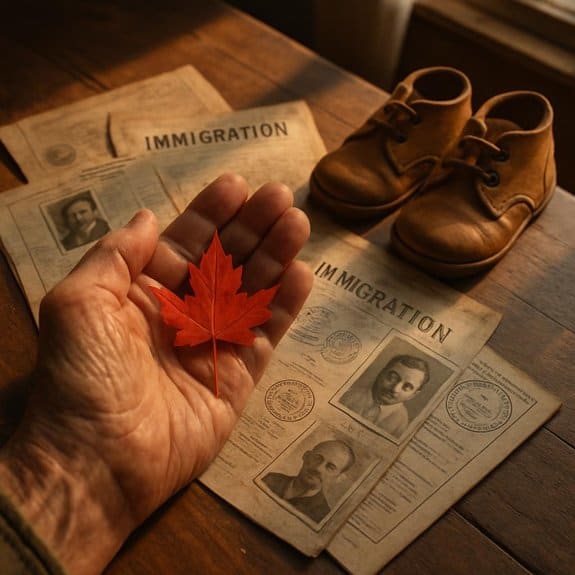
You can apply for permanent residence through a Humanitarian and Compassionate (H&C) application if you’re facing exceptional circumstances that would cause undue hardship if forced to apply from outside Canada. These applications provide exemptions to standard immigration rules for foreign nationals already in Canada without viable immigration routes. The complex process requires credible third-party evidence, takes 24-36 months to process, and doesn’t automatically preserve your legal status. Understanding the eligibility requirements and strategic timing will help you navigate this pathway effectively.
Understanding Humanitarian and Compassionate Applications
Humanitarian and Compassionate (H&C) applications provide a critical pathway for foreign nationals who don’t qualify for permanent residence through standard immigration programs but face compelling circumstances that warrant exceptional consideration.
These applications request exemptions to standard IRCC rules, allowing applicants to obtain permanent residence despite not meeting regular eligibility criteria.
You’ll typically consider H&C applications if you’re already in Canada without another viable immigration route. The process is complex and requires substantial, credible third-party evidence alongside skilled legal advocacy.
However, if you’re facing persecution, risk to life, or cruel treatment, you should pursue refugee protection instead, as these aren’t considered H&C grounds.
H&C applications can also excuse failures in temporary visa applications when circumstances warrant such consideration.
When Humanitarian and Compassionate Law Applies
When you don’t meet standard visa criteria but have compelling reasons for remaining in Canada, H&C law provides a framework for exceptional consideration based on your unique circumstances. This applies when you’re seeking permanent residence despite not qualifying under regular immigration classes.
You’ll typically find H&C applications relevant if you’re a long-term resident with significant establishment in Canada, excluded from family class sponsorship, inadmissible due to criminality or medical reasons, or a de facto family member without legal status.
The law also covers situations where you’ve overstayed your visa, have a denied refugee claim older than one year, or need to excuse failures in temporary visa applications. H&C grounds address situations where standard immigration rules would create undue hardship.
Eligibility Requirements and Restrictions
While H&C applications offer hope for those without traditional immigration pathways, strict eligibility requirements determine who can apply and when.
You’re eligible if you’re a foreign national in Canada without valid status, including overstayers, excluded family members, or those with denied refugee claims older than one year.
Foreign nationals in Canada without valid status, including overstayers and those with old denied refugee claims, may be eligible.
However, you can’t apply if you have an active refugee claim, received a negative IRCC decision within 12 months, or withdrew a refugee claim recently.
Designated Foreign Nationals face a five-year bar.
Important exceptions exist for the 12-month restriction: you can apply if you have children under 18 who’d suffer adverse effects from removal, or you have life-threatening medical conditions untreatable in your home country.
The One-Year Bar and Its Exceptions
One of the most significant barriers you’ll face when applying for H&C consideration is the one-year bar, which prevents applications from anyone who’s received a negative IRCC decision within the past 12 months.
This restriction includes rejected refugee claims, failed visa applications, and other negative immigration decisions.
However, two important exceptions can override this bar:
- Children under 18: If you have children under 18 who’d suffer adverse effects from removal, you can apply despite the one-year restriction.
- Life-threatening medical conditions: When you face medical conditions that can’t be treated in your country of origin, the bar doesn’t apply.
- Timing matters: The 12-month period starts from your negative decision date.
- Active refugee claims: You must withdraw any pending refugee claim before submitting your H&C application.
Maintaining Legal Status During Application Processing
Submitting your H&C application doesn’t automatically preserve your legal status in Canada, creating a critical challenge you’ll need to address throughout the lengthy processing period.
Filing an H&C application provides no automatic protection for your current immigration status in Canada.
IRCC can still issue removal orders while your application processes, making status maintenance essential.
You must actively maintain valid temporary status through work, study, or visitor permits during the 24-36 month processing timeline.
Apply for extensions before your current permit expires, ensuring you continue meeting all conditions and requirements of your status category.
Online extension applications typically take three months, while paper applications require longer processing times.
If your extension gets refused, you can only remain until your original status expires.
International travel isn’t recommended during H&C processing, as it may complicate your case.
Renewing Expired Canadian Resident Status
Current permanent residents facing expired PR cards encounter different renewal requirements than those seeking H&C applications. You must meet specific eligibility criteria to renew your permanent resident status successfully.
To qualify for PR card renewal, you must satisfy these requirements:
- Be a permanent resident physically present in Canada
- Not hold Canadian citizenship or registered Indian status under the Indian Act
- Have no active removal order against you
- Maintain a clean criminal record without disqualifying convictions
If you’re outside Canada with an expired or lost PR card, you can’t renew it directly. Instead, you’ll need to apply for a Permanent Resident Travel Document first, then return to Canada before initiating the renewal process.
Always verify your PR card remains valid with at least six months before any international travel.
Step-by-Step Application Process
Multiple forms and supporting documents comprise the foundation of every H&C application, requiring careful attention to detail throughout the submission process.
You’ll need to complete IMM 0008 (general application) and IMM 5283 (H&C request) if you’re applying from within Canada. Outside Canada, you’ll complete forms for your applicable immigration class while including H&C reasons.
Your detailed submission letter must explain your H&C grounds thoroughly.
You’ll gather credible supporting documentation including medical reports, country condition reports, employment records, and letters of support. After paying the processing fee, you’ll submit your complete application package.
Officers assess establishment in Canada, potential hardship, best interests of children, and unique circumstances.
Processing typically takes 24-36 months, requiring you to maintain legal status throughout.
Required Forms and Documentation
Although H&C applications demand extensive documentation, understanding the specific forms you’ll need streamlines the preparation process considerably.
You’ll start with core immigration forms that establish your basic information and circumstances.
Essential forms include:
- IMM 0008 (General Application) – your primary application form containing personal details and immigration history
- IMM 5283 (Document Checklist) – specifically for H&C requests made from within Canada
- Supporting evidence packages – medical reports, employment records, and country condition documentation
- Detailed submission letter – explaining your specific humanitarian grounds and circumstances
Beyond these mandatory forms, you’ll need credible third-party evidence supporting your case.
This includes letters from community members, employers, healthcare providers, and any relevant government or institutional documentation that strengthens your humanitarian argument.
Key Assessment Factors for H&C Applications
When IRCC officers evaluate your H&C application, they’ll examine four primary factors that determine whether your circumstances warrant an exemption from standard immigration requirements.
Establishment in Canada considers your length of residence, employment history, community involvement, language abilities, and financial self-sufficiency. Officers assess how deeply you’ve integrated into Canadian society.
Best interests of affected children examines how removal would impact any children under 18, including their emotional needs, education, and ties to Canada.
Hardship in your home country evaluates whether you’d face discrimination, lack of healthcare, or compromised safety upon return, even if it doesn’t meet refugee protection thresholds.
Family separation assesses the effects of removal on Canadian citizen or permanent resident family members who depend on you.
Processing Times and What to Expect
Understanding the timeline for your H&C application helps you plan accordingly and maintain proper status throughout the process. Processing typically takes two to three years for in-Canada applications, though incomplete documentation can extend this timeframe considerably.
During this extended period, you’ll need to carefully manage several important considerations:
- Status maintenance – Submit extension applications before your current permits expire to avoid losing legal status.
- Documentation requests – Respond promptly to any additional evidence requests from IRCC officers.
- Travel restrictions – Avoid international travel during processing, as it may complicate your application.
- Communication updates – Notify IRCC immediately of any address changes or considerable circumstance modifications.
Remember that submitting an H&C application doesn’t automatically preserve your legal status, so proactive status management remains essential throughout the lengthy process.
Qualifying Humanitarian Reasons and Examples
Since H&C applications depend entirely on demonstrating compelling circumstances that warrant exceptional consideration, you’ll need to understand what situations typically qualify as humanitarian reasons.
Strong establishment in Canada through long-term residence, employment, and community ties forms a primary factor. Life-threatening medical conditions requiring treatment unavailable in your home country represent another qualifying ground.
Children under 18 who’d face adverse effects from removal create compelling circumstances, particularly when they’re Canadian citizens or deeply established here.
Family separation from Canadian spouses, children, or dependents constitutes humanitarian grounds.
Significant hardship upon return to your country of origin, including discrimination, lack of healthcare, or compromised safety, can qualify even if it doesn’t meet refugee definitions.
Economic hardship alone typically isn’t sufficient unless combined with other factors.
What Happens After Application Approval
Once IRCC approves your H&C application, you’ll receive an Approval in Principle (AIP) letter that marks the beginning of the final processing stage rather than immediate permanent residence.
This approval means IRCC has accepted your humanitarian and compassionate grounds, but you must still complete additional requirements.
After receiving AIP, you’ll need to:
- Complete medical examinations with an IRCC-approved panel physician
- Undergo criminal background checks and security screenings
- Submit updated documents if requested by immigration officers
- Pay any outstanding fees related to permanent residence processing
Once you pass all admissibility checks, IRCC will issue your Confirmation of Permanent Residence (COPR).
You can then apply for your permanent resident card, which serves as official proof of your status in Canada.
Options Available After Application Refusal
While approval brings relief and new opportunities, refusal doesn’t mark the end of your immigration journey. You have several meaningful options to pursue after an H&C application denial.
Your primary recourse is seeking judicial review at the Federal Court of Canada. You must file this request within 15 days of receiving the refusal decision. If successful, the court will return your case for redetermination by a different immigration officer.
You can also submit a new H&C application if your circumstances have changed considerably. New evidence, family developments, or worsening conditions in your home country may strengthen your case.
In urgent situations, you might request deferral of removal while exploring other options. Each path requires careful consideration and strategic planning.
How Legal Representation Can Strengthen Your Case
Although H&C applications represent one of the most complex areas of Canadian immigration law, experienced legal representation can remarkably improve your chances of success.
Immigration lawyers understand the nuanced assessment criteria and can craft compelling narratives that resonate with immigration officers.
Professional legal advocacy strengthens your case through:
- Strategic case development – Lawyers identify the strongest H&C grounds specific to your circumstances
- Evidence gathering – They know what documentation carries weight and how to obtain credible third-party support
- Persuasive submissions – Legal professionals craft detailed arguments that effectively communicate your humanitarian factors
- Procedural expertise – They guarantee compliance with complex filing requirements and deadlines
Given processing times of 24-36 months and the high stakes involved, investing in skilled legal representation notably enhances your prospects for approval.
How Canadian Currents Immigration Services Can Help
When you’re facing the complexities of an H&C application, Canadian Currents Immigration Services brings together a thorough team of immigration lawyers, consultants, and paralegals with decades of collective experience in immigration law.
Our professionals understand that each H&C case requires a tailored approach to achieve the best possible outcome for your specific circumstances.
We’ll work closely with you to build a compelling case that addresses all relevant factors, from establishment in Canada to potential hardship in your home country.
Our team knows how to gather credible third-party evidence, prepare persuasive submission letters, and navigate the intricate requirements of H&C applications.
We’re committed to providing efficient, cost-effective legal services while ensuring your immigration needs receive the attention they deserve throughout this complex process.

We serve ALL of Canada. Currently have offices Western Canada — Vancouver, Calgary, Edmonton, Kamloops and Red Deer. We also have the infrastructure to work with any of our clients virtually — even from the furthest regions of the Yukon to Newfoundland.
Call (778) 331-1164 [toll free 1 (844) 715-0940] to get routed to the best office for you or contact us online to schedule an appointment.
We also have a dedicated intake form to help you get the ball rolling. Our intake team will review your specific case and advise you on the next steps to take as well as what to expect moving forward.
Our offices are generally open 8:30 a.m.—4:30 p.m., Mon—Fri.


Amrita Gill
IMMIGRATION LAWYER
Amrita strives to provide culturally competent, empathetic, clear, and practical legal support to her clients. Amrita’s goal is to ensure that her clients are comfortable, informed, and heard. She focuses primarily on permanent resident and temporary residence applications and appeals, super visa applications and appeals, sponsorship applications, refugee applications, and matters involving the interplay of immigration law with employment law.


